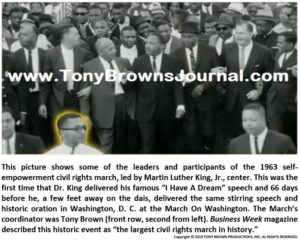Therefore, on Monday, April 11, 2022, I celebrate the 89th anniversary of my miracle, I pledge to all of my friends on TonyBrownsJournal.com, Facebook, Instagram, Twitter, and LinkedIn, and all of their friends on their respective pages to salute your potential to learn and to grow as you mature. I am motivated by my experiences in life to follow the truth and I share the Truth of God. Sharing the truth is the ultimate acknowledgment of God; trust is the necessary ingredient. Trust, self-respect, self-empowerment, and responsibility comprise the necessary steps that are required to achieve a successful outcome. These aforementioned principles underlie my pledge to you that I will always endeavor to share the truth. Therefore, my next installment message will come to you in my upcoming and final book, “Walking Between The Raindrops,” I will conclude my final message to this audience. For info on the contents and the release date www.TonyBrownsJournal.com/Upcoming-Book
A HISTORIC AND PERSONAL STORY
On June 23, 1963, in Detroit’s Cobo Hall, I listened to Martin Luther King, Jr. deliver his famous “I Have A Dream” speech, for what many historians claim was the first time. Dr. King was in Detroit for the “Walk to Freedom” march that I coordinated. I was on the stage with the members of the Board of Directors of the Detroit Council for Human Rights, I was the youngest member, looking out at the overflowing audience, drinking in the soul-stirring words. I became aware that I was passionately committed to tearing down the injustice of America’s racist society. On that day in 1963, I also discovered the source of that passion as King’s words echoed in my mind. “I have a dream my four little children will one day live in a nation where they will not be judged by the color of their skin but by content of their character. I have a dream today!” Dr. King proclaimed to a resounding ovation. And at that moment, I felt a profound sense of realization of reality.
BACK IN THE DAY
This story begins on the greatest day of my life. All of what happens in this tale of struggle takes place because I was nominated and elected to such a prominent position of coordinator of this spectacular civil rights march in Detroit on June 23, 1963 by the Council’s governing board, all of whom were prominent Black community leaders. However, at the time the fate of such a bold movement was in great doubt in the minds of most of the Black and White leadership. In their minds, it was a Fool’s Errand, at best. I also suggested the name for the event: “Walk To Freedom With Martin Luther King, Jr.”
Dr. King had agreed to lead the march because his ecclesiastical friend, Rev. C. L. Franklin, the chairman of our organization and the father of singer Aretha Franklin, asked him to do so and pledged whatever funds we received to Dr. King’s organization, the SCLC.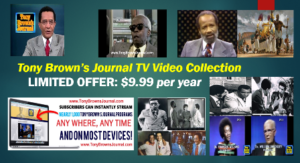
We may honor Martin Luther King with a national holiday, but back in the day he was considered a societal pest by many in power. He irritated almost every ruler. As a Black person, he dared to comment on international affairs -- including the Vietnam War before it became unpopular. Black leaders were relegated to commentary on “Negro affairs.” King was Colin Powell and Condoleezza Rice long before Blacks could be Secretary of State and the nation’s National Security Advisor. But Martin Luther King was a Black leader only in the sense that his ethnicity was African. His dignified and principled nature and his intellect were also a bit much for many in the Black elite leadership. However, they saw a man who although uncompromising in his politics, was vulnerable in his private life. His critics, Black and White, used both vulnerabilities against him. King’s imperfections made him vulnerable and a victim of sorts -- like the masses among Blacks who forgave his shortcomings because they felt he was a powerful force against high rent, unemployment, poor education and police brutality. The Memphis sanitation workers, for example, knew that he was trying to do something about the plight of the common person. Among the Black middle class, his achievements in education and his quick mind were strong attractions -- enough to make them give him the benefit of the doubt.
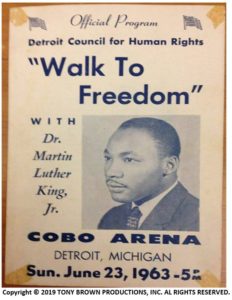 DETROIT: THE STRATEGIC FRONT
DETROIT: THE STRATEGIC FRONT
Detroit was a thriving labor town for Blacks, with a solid Black middle class that had emerged from the automobile factories. Just the right demographic and psychographic profile for a huge King breakthrough in the North. The historic task of opening this Northern gateway fell squarely in the lap of a Detroit group that was anxious to join the mostly Southern movement and open a new front with a massive demonstration of support. This dynamic ad hoc group elected me the coordinator of this strategic march after a local Black millionaire named James Del Rio, who later became a judge, asked me to become a founding member of the newly-organized Detroit Council for Human Rights, and run its office.
In short, I was recruited by a group of acknowledged elders because of my influential role in the Black community, as a writer for a Black newspaper, my intense energy and enthusiasm for community causes and for my youthful outlook. I had recently received a Master’s Degree in Psychiatric Social Work and earned a reputation for being an earnest worker.
Many people think that life is like a football and it takes a lot of unpredictable bounces. Mama, a maid and a dishwasher back in Charleston, W. Va. gave that theory a unique twist. She told me that life is a series of choices. Good choices create good outcomes; bad choices, bad ones. By the time I met Dr. King, I took that statement to mean that the only way you can duplicate anyone’s success is to share the same vision of reality. Martin Luther King, Jr. would later put wind under those wings with words like freedom and equality when he entered my life on June 23, 1963. Moved by an energy rarely seen among Aframericans since Dr. King walked among us, an eclectic ocean of Black people reverently followed him down Woodward Avenue in Detroit that beautiful Sunday afternoon. Then, at the conclusion of the march, for the first time, came his I Have A Dream speech. Whether his signature Dream speech was delivered for the first time in Detroit on June 23, 1963, as I have believed for years, or at Rocky Mount, NC, Albany, GA or Huntsville, AL, as some in those cities believe. For me this Detroit epiphany will always be the first day of my new life – as a man who would find freedom in his own country or die trying.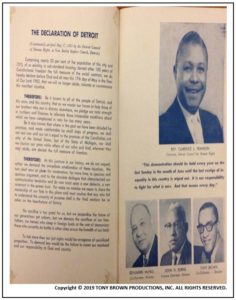
“LARGEST CIVIL RIGHTS MARCH IN HISTORY”
The following week, in its July 29, 1963 edition, Business Week magazine called the Detroit event the “largest civil rights march in history.” Subsequently, an official police source, in an affidavit, confirmed an attendance of “no fewer than 250,000 and as many as 500,000 people.” Black people came mostly from throughout the nearby Midwest region.
More official confirmation has been forthcoming since then. Nearly 40 years later, in 2003, The Wall Street Journal would report on page one that the famed King Dream speech may have had it roots -- not at the March on Washington (which drew 250,000), on August 28, 1963, but elsewhere, perhaps 66 days before in Detroit, Michigan where the attendance may have reached, according to an official police affidavit, 500,000.
Although I had no official role in the Washington march, I did witness it as a correspondent for the Detroit Courier newspaper, an affiliate of the Black Press, from the steps of the Lincoln Memorial within a few feet of Dr. King and I was included in Life magazine’s limited photo coverage of the event.
All of this in only 66 days! My head was spinning with excitement and wonderment. It seemed that my Detroit decision to choose activism as a way of life had become my destiny.
EPIPHANY
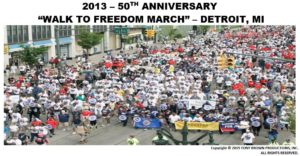 Dr. King came along at a most opportune time for me and millions of other African Americans as we struggled with self-doubt and misdirection; we would join the institutionalized African Americans and embrace a mutual concept of non-violence. Together King taught both disparate Black philosophies how to unify our movement and strengthen our ranks as a people of peace who could use non-violence as a weapon of force. We were hungry and Dr. King fed us. And it was when he began his Dream speech that his power really revealed itself.
Dr. King came along at a most opportune time for me and millions of other African Americans as we struggled with self-doubt and misdirection; we would join the institutionalized African Americans and embrace a mutual concept of non-violence. Together King taught both disparate Black philosophies how to unify our movement and strengthen our ranks as a people of peace who could use non-violence as a weapon of force. We were hungry and Dr. King fed us. And it was when he began his Dream speech that his power really revealed itself.
Every word King uttered stirred our souls! It was magnificent! At each mention of his dream, and each time he belted out his signature words, “I have a dream,” the crowd just went wild. And that’s an understatement. After drinking in the soul-stirring words, I knew that I was passionately committed to tearing down the injustice of America’s racist institutions with non-violent tactics. On that day in 1963, King became the source of that passion.
Equality is the powerful idea that defines the reality that MLK was trying to show us. Once the concept sinks in, it burrows deep -- deeper than many of us suspect. If you don’t want to confront the truth, I believe that you should leave equality alone. In my experience, the truth can be both illuminating and painful -- all at the same time, almost a psychic ambivalence. Which, I believe, is what I perceived in Dr. King the day I met him.
REALITY AND TRUTH
Mama taught me that power is an illusion if it is not the power of the spirit, that wealth is counterfeit if it is not the wealth of the heart. To me, this is the key to success and happiness. Fear and separation are inside the box; freedom and reconnection are out of the box. The choice is limitation versus unlimited possibilities! In his own way and, especially with his “I Have A Dream” speech, Martin Luther King made the identical statement.
Because of these basic core values from my childhood, for me, the civil rights movement moved from the streets to the suites and took on a deeper meaning. It went from the admiration of Black role models to self-empowerment of the individual and on a reality plane from the visible to the invisible.
Equality revealed itself to me as a basic form of love, a oneness of the spirit. Humanity is a literal gold mine, and the key that unlocks the door to these vast riches is
the knowledge of who we are.
Mama said that because our nation is invested in the unreal concept of race, America doesn’t have a race problem, it has a reasoning problem. Of course, being a child and knowing everything, her statement went unheeded. Besides, I was limited to the reality I could see and touch.
However, being like most people, the older I get the smarter my Mama becomes. That’s why by the time I heard Martin Luther King deliver Mama’s core message in Detroit on June 23, 1963 when I was 30 years-old, I intuitively knew that he was right. Your truth being self-evident, you know it when you hear it. MLK’s Dream speech had the effect of pushing me further down the path that Mama had already placed me on.
I was beginning to realize that Black people and White people are basically the same. Most of us are average. We have a few geniuses and a liberal sprinkling of fools.
THE MOTHER OF MY LIFE
The Mama of my life story was not my biological mother, but Elizabeth Sanford, an Aframerican maid and dishwasher, the woman who informally adopted me when I was two months old. No mother could have been more loving or faithful than the woman who guided the first 12 years of my life. I thank the Heavens for this blessing.
In short, the Mama of my story was the Savior of my life who was sent to protect me and protect this unworthy soul from the environment of social rejection and physical hunger in which my development had been placed.
I thank the Gods of Heaven for the blessings of being born Black, Poor and Hungry for food and knowledge with the humility to accept the only condition that would raise me to the level I have achieved during this lifetime which is near its conclusion on this Earth Plane.
Then comes the final act on Earth: a transition to my spiritual home on a Heavenly Plane where the weather fits my clothes. May The ALL light my path.

